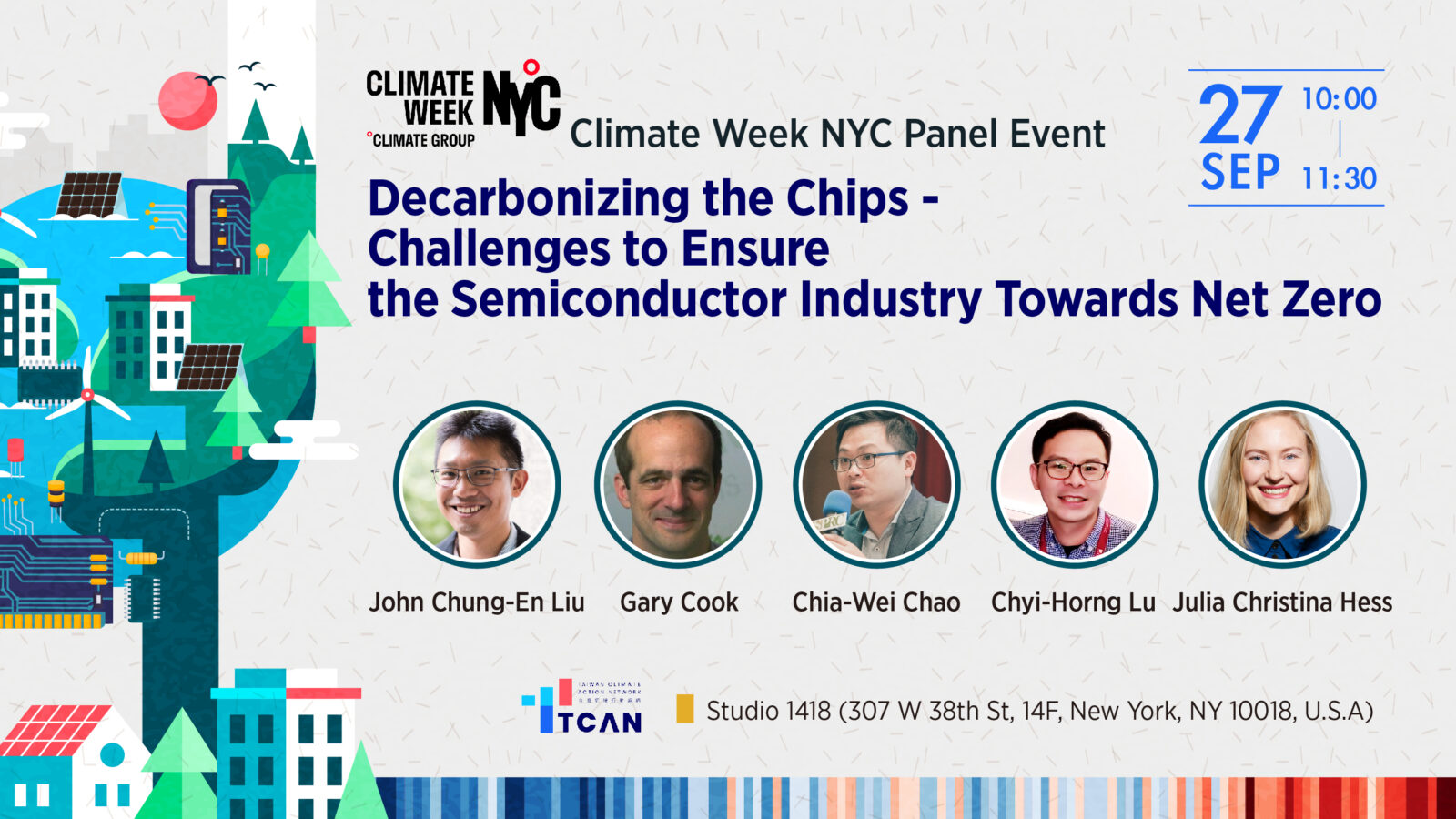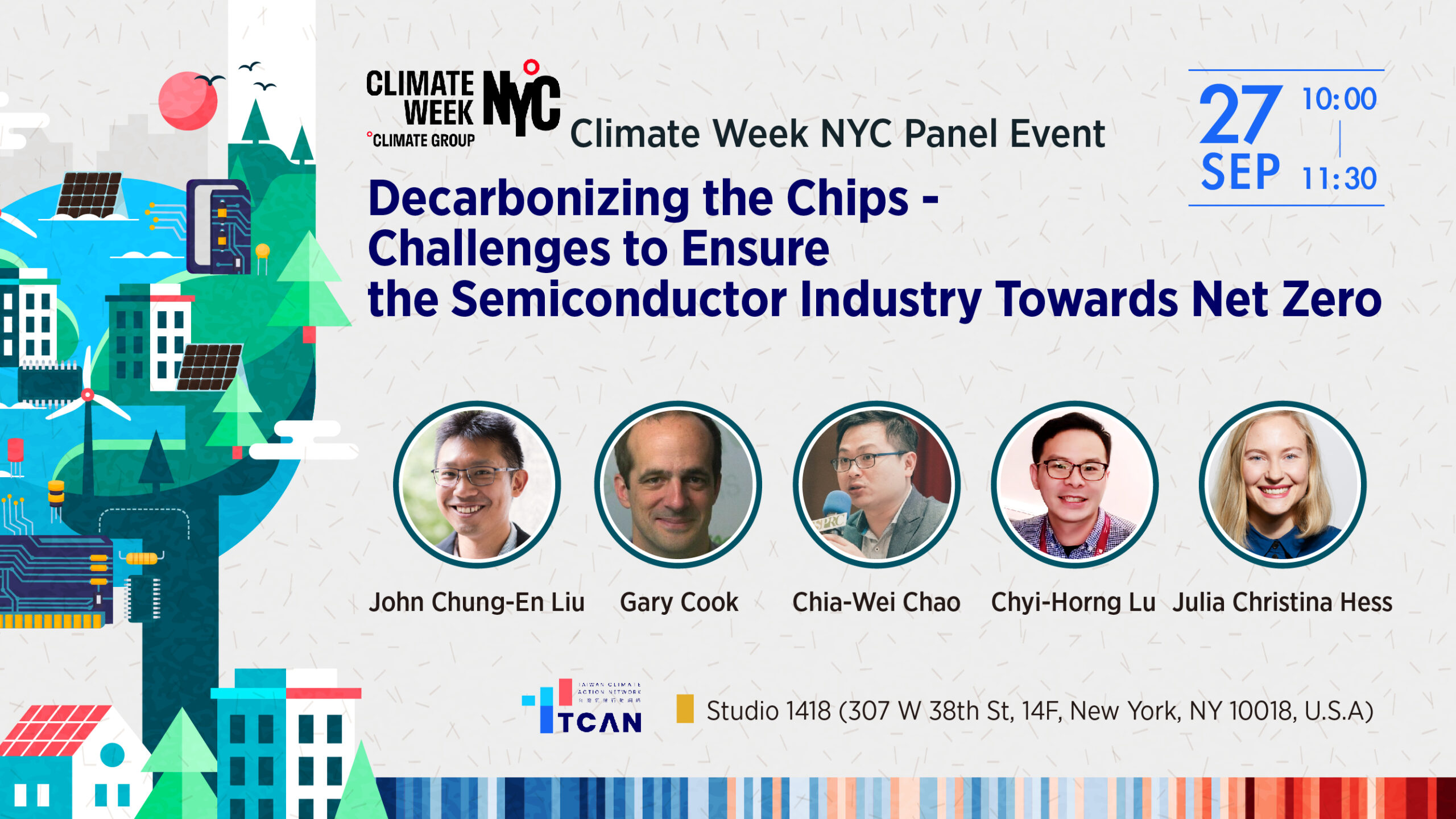
Venue:Studio 1418 (307 W 38th St, 14F, New York, NY 10018, U.S.A)
Please register by clicking here
Since spaces are limited, we will respond to successful applicants within three days after your submission. The event will be live streamed, we will send you the livestream link of this event if you participate virtually. However, we can’t guarantee the quality of livestream, if there is any technical difficulty, the organizer will upload the recording of this event afterwards.
Since semiconductor chips are becoming strategic materials in this digital age, the EU, US, and Japan all proposed a new plan to expand domestic production capacity. These strategies, however, hardly include the decarbonization consideration in the scope. According to the experience in Taiwan, the rising electricity demand of the semiconductor industry creates a dramatic challenge to renewable energy supply and the nationally determined contribution (NDC). Currently, Taiwan Semiconductor Manufacturing Co. (TSMC) has already become the third biggest corporate carbon emitter in Taiwan since 2022.
The major chip manufacturers, including TSMC, Intel, and SK Hynix, have already committed to RE100 to meet the net-zero pledge made by Apple and other major buyers. Nevertheless, the contradiction between time and geographical horizon along the global supply chain is hardly discussed. Although the industry launched the “Semiconductor Climate Consortium” to drive progress on climate challenges within the whole value chain in 2022, there is no collaborative campaign strategy from international climate advocacy.
In light of the aforementioned circumstances, the Taiwan Climate Action Network will share the study on the net-zero pathways for Taiwan’s semiconductor industry. We are also inviting related think tank teams from the United States and Europe as discussants, and they will analyze how these countries have considered the environmental footprint of the semiconductor industry in their recent developments. Through this opportunity, we aim to shape an international network of civil society organizations that supervise the semiconductor industry’s fulfillment of net-zero commitments.
Moderator:
- John Chung-En Liu/Associate Professor, Department of Sociology, National Taiwan Uni.(Taiwan)
John Chung-En Liu is an Associate Professor of Sociology at National Taiwan University, where he is involved in the International Program on Climate Change and Sustainable Development. He earned his Ph.D. in Sociology from the University of Wisconsin–Madison. Previously, he served as an Assistant Professor at Occidental College and a Postdoctoral Fellow at the Harvard Kennedy School. His research applies a sociological lens to climate change and environmental issues, focusing on Taiwan’s efforts toward net-zero emissions through initiatives like Just Transition and carbon pricing. His work is published in various journals and seeks to contribute to practical policy solutions.
Speakers:
- Chia-Wei Chao/Research Director, Taiwan Climate Action Network / Adjunct Assistant Professor of Program in Climate Change & Sustainable Development, National Taiwan Uni.(Taiwan)
Dr. Chia-Wei Chao received his PhD degree in Graduate Institute of Environmental Engineering from the National Taiwan University in 2013. His research focuses are sustainability transition and industrial ecology.
Dr. Chao has been actively involved in the climate and energy policy since 2007, to provide evidence-based policy suggestions for environmental NGOs. He founded Taiwan Environment and Planning Association 2020 to establish a transdisciplinary platform to maximize the synergies between ecosystem service and renewable energy development. Since 2022, five environmental NGOs launched the Taiwan Climate Action Network initiative to accelerate net-zero policy action in Taiwan. Currently, Dr. Chao leads the research unit under the initiative. He also teaches “Pathways towards Net-Zero” at National Taiwan University and National Chengchi University.
- Chyi-Horng Lu/Researcher, Taiwan Political Economy Collaborative (Taiwan)
Dr. Chyi-Horng Lu is an economic researcher at the Taiwan Political Economy Collaborative (TPEC), an independent economic think tank in Taiwan that supports labor unions, NGOs, and other social movement groups through financial, economic, and policy research.
Dr. Lu earned his Ph.D. in Economics from National Taiwan University and has previously held positions as a postdoctoral researcher in the Department of Economics at MIT, a visiting scholar at Boston University, and an assistant researcher and deputy team leader at the Taiwan Institute of Economic Research. He also worked as an industry researcher for a private equity firm. Since the early 2000s, Dr. Lu has actively participated in various social movements in Taiwan, including labor, environmental, and civil movements, with the personal mission of advancing these causes through economic research.
- Julia Christina Hess/ Senior Policy Researcher, interface (Germany)
Julia Hess is a Senior Policy Researcher for “Global Chip Dynamics”. Her focus is on the strategic relevance of semiconductors and the analysis of the global, interdependent value chain. Most recently, Julia presented her work to the Committee on Industry, Research and Energy in the European Parliament.
Julia has been working at SNV since 2019, initially conducting research at the intersection of AI and foreign policy with a focus on AI governance. In 2021, she was a fellow at the Gesellschaft für Informatik’s AI Camp. Before joining SNV, Julia worked in press and communications at various science and cultural institutions and NGOs, most recently at the Max Planck Institute for Human Development. She studied media culture and sociology at the University of Cologne and completed her master’s degree in social and business communication at the Berlin University of the Arts.
- Gary Cook/ Climate & Renewable Energy Strategist, the Author of Clean Clicks or Dirty Chips?(U.S.)
Gary Cook has bench-marked the decarbonization efforts by across a broad range of sectors for the past 25 years. Gary served as lead IT sector analyst and corporate negotiator for Greenpeace’s highly successful Clicking Clean campaign from 2010-2020, successfully challenging Facebook, Apple, Google, Amazon, Samsung, and other global IT brands to commit to transition to 100% renewable sources of electricity. These commitments played an important role in catalyzing a wave of renewable energy deployment to meet the fast-growing energy demand of global data center operators.
Gary recently authored “Clean Clicks or Dirty Chips?”, analyzing the dramatic increase in electricity demand associated with the expansion of manufacturing capacity currently underway, and the extent to which this rising demand is being met with renewable electricity. The report found that despite commitments to 100% renewable energy, the ongoing expansion of semiconductor manufacturing by semiconductor giants is increasing demand for fossil fuels, due to the continued heavy reliance on renewable energy certificates that do little to increase the supply of renewable energy on the grid.
Gary has also recently served as a member of the Expert Advisory Group for the Science Based Target Initiative’s(SBTi) Net Zero Standard as well as the SBTi Standard for the Oil and Gas Sector.
Hosted by:
Taiwan Climate Action Network
For inquiries, please contact: tcan2050.official@gmail.com
Video Recording of the event:

